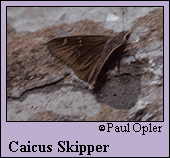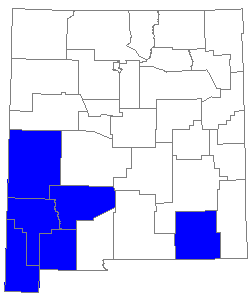 |
 

 |



Caicus Skipper (Cogia caicus [Herrich-Schäffer])
Wing span: 1 5/8 - 1 3/4 inches (4.2 - 4.5 cm).
Identification: Upperside is glossy dark brown; forewing has small clear spots. Underside of hindwing is dark brown; hindwing has 2 dark bands and white scales on the outer edge.
Life history: Fully-grown caterpillars hibernate.
Flight: Several broods from March-August.
Caterpillar hosts: Various acacias in the pea family (Fabaceae).
Adult food: Flower nectar.
Habitat: Roadsides, trails, forest openings and edges.
Range: Local and scarce from Guatemala north through Mexico to central Arizona and central New Mexico. Range may be expanding in the Southwest.
Conservation: Not usually required.
The Nature Conservancy Global Rank: G4 - Apparently secure globally, though it might be quite rare in parts of its range, especially at the periphery.
Management needs: None reported.
References:
Bailowitz, R. A., and J. P. Brock. 1991. Butterflies of southeastern Arizona.
Sonoran Arthropod Studies, Inc., Tucson, Arizona. 342 pages.
Scott, J. A. 1986. The butterflies of North America. Stanford University Press,
Stanford, Calif. 583 pages, 64 color plates.
Tilden, J. W. 1986. A field guide to western butterflies. Houghton-Mifflin Co.,
Boston, Mass. 370 pages, 23 color plates.
Author: Jane M. Struttmann
State and Regional References:
Ferris, C.D. and F.M. Brown. 1980. Butterflies of the Rocky Mountain States.
University of Oklahoma Press. Norman.
Opler, Paul A. 1999. Peterson Field Guide to Western Butterflies, revised
edition. Houghton Mifflin Co., Boston, Mass.
Stanford, R.E. and P.A. Opler. 1993. Atlas of Western USA Butterflies.
Privately published, Denver, Colo.
Tilden, J.W. and A.C. Smith. 1986. A Field Guide to Western Butterflies.
Houghton Mifflin Co., Boston, Mass.
Add Toliver, M., Holland, R., and S.J. Cary. 1996. Distributional data
for New Mexico Butterflies. Privately published. Albuquerque, N.M.

